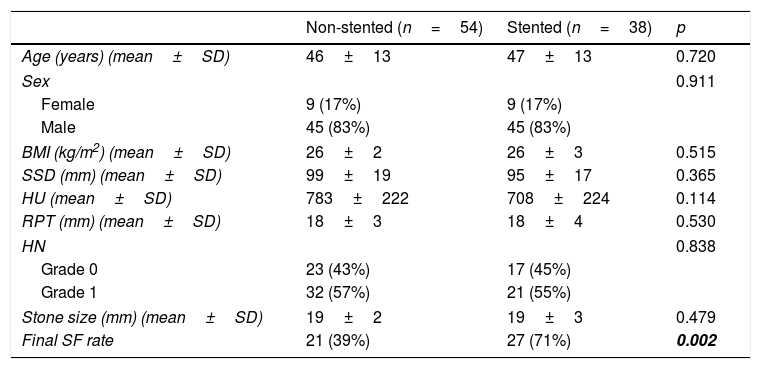To evaluate the effect of JJ stents on SWL treatment of moderate (15–25mm) renal pelvic stones.
Materials and methodsBetween January 2016 and December 2017, a total of 152 adult patients who were planned to undergo SWL for a single radiopaque renal pelvic stone were included in the study. Patients with solitary kidney, congenital abnormality, skeletal tract abnormalities, previous urinary system surgery, hydronephrosis (grade 2 or more), untreated urinary tract infection, bleeding disorder, and suspected pregnancy were excluded. The remaining 114 patients were randomly divided into two groups; non-stented and stented. Twenty-two patients whose stone could not be fragmented despite 3 consecutive sessions were also excluded from the study. A total of 92 patients (54 non-stented and 38 stented) were included in the final analysis.
ResultsThere was no significant difference in terms of age, sex, body mass index, renal parancyhimal thickness, hydronephrosis, skin-to-stone distance, Hounsfield units, and stone size between the groups. Success was significantly higher in the stented group than in the non-stented group (71% vs. 39%, p=0.002). In stone-free patients, the number of emergency department visits and analgesic tablet consumption was significantly lower in the stented group than in the non-stented group (p<0.001 and p<0.001, respectively). In non-stone-free patients, analgesic tablet consumption was significantly lower in the stented group than in the non-stented group (p=0.004).
ConclusionsPre-stenting before SWL treatment of moderate sized renal pelvic stones has some advantages in terms of success, emergency service visits, and analgesic tablet consumption.
Evaluar el efecto de la colocación del catéter doble J en el tratamiento con LEOCH de los cálculos en la pelvis renal de tamaño moderado (15-25mm).
Materiales y métodosEntre enero de 2016 y diciembre de 2017, se incluyó en el estudio a un total de 152 pacientes adultos que serían tratados con LEOCH por un solo cálculo radiopaco localizado en la pelvis renal. Se excluyeron los pacientes con riñón solitario, anomalía congénita, anomalía del sistema esquelético, cirugía previa del tracto urinario, hidronefrosis (grado 2 o superior), infección del tracto urinario sin tratar, trastorno hemorrágico y sospecha de embarazo. Los 114 pacientes restantes se dividieron aleatoriamente en 2 grupos: cateterizados y no cateterizados. Veintidós pacientes cuyo cálculo no pudo fragmentarse después de 3 sesiones consecutivas también fueron excluidos del estudio. Un total de 92 pacientes (54 no cateterizados y 38 cateterizados) se incluyeron en el análisis final.
ResultadosNo hubo diferencias significativas entre los grupos respecto a edad, sexo, índice de masa corporal, grosor parenquimal renal, hidronefrosis, distancia piel-cálculo, unidades Hounsfield y tamaño del cálculo. El éxito fue significativamente mayor en el grupo cateterizado que en el grupo no cateterizado (71 vs. 39%; p=0,002). En pacientes libres de cálculos, el número de visitas al servicio de urgencias y el consumo de analgésicos fue significativamente menor en el grupo cateterizados que en el grupo no cateterizados (p<0,001 y p<0,001, respectivamente). En pacientes no libres de cálculos, el consumo de analgésicos fue significativamente menor en el grupo cateterizados que en el grupo no cateterizados (p=0,004).
ConclusionesLa colocación de catéter antes del tratamiento con LEOCH para cálculos en la pelvis renal de tamaño moderado tiene algunas ventajas en términos de éxito, visitas al servicio de urgencias y consumo de analgésicos.
Artículo
Comprando el artículo el PDF del mismo podrá ser descargado
Precio 19,34 €
Comprar ahora









